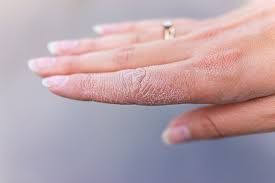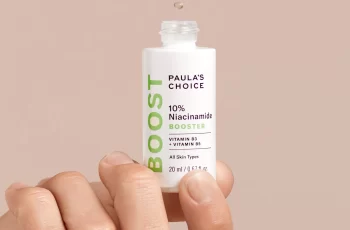Dry Skin Causes and Treatment
Dry Skin
Dry skin is caused by a defect in the skin barrier. Tiny holes in the skin barrier is the reason that you get dry skin. These holes allow water to evaporate off the skin’s surface- leading to dehydrated skin. The goal is to patch those holes in the skin using a combination of important fats (lipids). Dehydration is a barrier to skin health and should be corrected to obtain moisturized healthy skin. When skin has multiple problems, dehydration is the most important skin condition and should be treated first. Without water, the skin cannot protect and repair itself. Super dry skin is more likely to develop inflammation and infection than moisturized skin. Very dry skin is rough to the touch and often itches. Darker skin types develop ashy skin when skin is dry.
What is the Skin Barrier?
The skin barrier is made of stacks of disk like lipids known as lamella that surround each skin cell. This skin barrier protects the skin from dehydration and exposure to allergens and irritants by giving it a protective coating. The lipids that protect the skin cells and form the skin barrier are made up of cholesterol, ceramides and fatty acids. Detergents, friction, chlorinated water, excessive heat, and using the wrong skin care products can injure the skin barrier. Diet, medications (such as cholesterol lowering drugs) and stress can also affect the ability of the skin barrier to protect the skin.
How To Treat Dry Skin on the Face?
If you have dry skin, your skincare regimen should be personalized for your specific Baumann Skin Type®. Everything that comes into contact with your skin will affect skin health, so it is critical to follow your skin care regimen instructions exactly. The main goal of treating dry skin is to protect and strengthen the skin barrier. Cleansers and moisturizers make the biggest difference in correcting dehydration.
How to Treat Dry Skin on the Body?
Apply oil to skin when still damp and cover with a barrier repair body moisturizer.
Skin Care For Dry Skin
Hydrating Cleansers-
Cleansers that form bubbles and suds can remove lipids from the skin and injure the skin barrier. Use only nonfoaming cleansers. Look for cleansers with oils, fatty acids like stearic acid, shea butter, and MLE technology.
Best Scrubs for Dry Skin-
Friction can hurt the skin barrier so we do not recommend scrubs for super dry skin that is scaled, pink or cracked. If you have mildly dry skin, a gentle scrub can be used 2-3 times a week followed by a barrier repair moisturizer.
Toners for Dry Skin
Most toners are not good for dry skin because they have alcohol such as denatured alcohol. Fatty acid alcohols do not injure the skin barrier but simples alcohols do.
Moisturizing Creams For Dry Skin
Barrier repair moisturizers are a must for people with dry skin. Look for “MLE technology”, Myristoyl/palmitoyl oxostearamide/arachamide MEA, or PSL Repair technology or the 3 important lipids: ceramides, cholesterol and fatty acids (like stearic acid) on the product labels. Stearic acid is a hydrating fatty acid that may be on the skin care product label as glyceryl stearate, cocoa butter or shea butter.
Hydrating Oils For Dry Skin
Oils containing anti-inflammatory ingredients such as Argan oil, Jojoba oil and Safflower oil are the best oils for dry skin. These hydrating oils can be applied to damp skin or added into the bath. Moisturizers and oils should be used at least twice a day and should be applied to damp skin after bathing. Avoid over drying the skin with the towel and pat skin dry to prevent excess friction. You can apply the moisturizer or the oil first- depending on your preference.
How To Take Care of Dry Skin?
Do not use soap, bubble bath, shampoo, or foaming shaving creams on the skin.
Do not use scrubs, facial brushes or other friction causing products on very dry skin.
When cleansing, bathing, or showering use lukewarm water.
Avoid staying in water for over 5 minutes when possible.
Decrease the frequency of baths and showers.
Use mild fragrance-free laundry detergents such as Tide Free and ALL Clear
Avoid organic laundry detergents because they often irritate the skin.
Tips For Dry Skin
If you have super dry skin, follow these tips to help protect your skin barrier. Avoid very hot water, chlorinated water, hard water or immersing yourself in water for long periods of time. If you live in a dry climate, add a humidifier to your house/ office whenever possible. Try and get 7 + hours of sleep a night, exercise regularly and do stress relieving activities. Stress has been shown to lead to damage to the skin barrier.
How To Cure Dry Skin On The Face Overnight?
The best treatment for dry skin is consistent use of the proper cleansers and moisturizers for your Baumann Skin Type® to repair your skin barrier. You should be using a personalized skin care routine for dry skin every day. If you need to look good in the morning and you want to treat your dry skin overnight- here is a dry skin tip- but this is only in an emergency situation and does not take the place of a daily skin care routine for dry skin. This dry skin tip will help you improve dry skin fast but the results are temporary.
Use a facial scrub for dry skin to remove dead skin cells. Follow with a moisturizing serum- preferably with hyaluronic acid and glycerin. Cover with a barrier repair moisturizer. This should help you turn rough dry dull skin into moisturized fresh skin overnight.
Food For Dry Skin
Foods that hydrate skin have nourishing oils. Linoleic acid is a fatty acid that soothes and hydrates. Look for oils that have high amounts of linoleic acid. Hydrating foods to add to your diet if you have dry skin are salmon, mackerel, sardines, flax seed oil, nuts and seeds, and avocados.
How Do I Know if I Have Dry Skin or Eczema?
Eczema is a condition of severe dry skin that can become inflamed and is susceptible to infection. There are many eczema creams to treat eczema. Look for eczema cleansers and moisturizers to treat dry skin. These are called eczema creams, eczema oils, skin barrier creams or barrier repair moisturizers. If creamy cleansers and barrier repair moisturizers do not improve your skin in 4 weeks- see a dermatologist to see if you have eczema and need a prescription medication. You can find a STS approved medical provider here.
Not all dry skin is eczema. Often you are dry because you live in a dry climate or you are using the wrong skin care products for dry skin or you have lifestyle habits that are interfering with your skin’s production of lipids to hydrate the skin.
DQH Knowledge drop: In your 20s, your skin cell turnover decreases. (Cell turnover is a key component in keeping your skin youthful.) You know what else slows down? Your collagen production. Starting in your 20s, collagen decreases by about 1 percent per year. Should you want to prevent fine lines and wrinkles, start by eliminating behaviors that contribute to premature aging. “If it’s bad for you, it’s bad for your skin,” says dermatologist Michel Somenek.
“Cigarette smoking reduces blood flow to the skin and causes premature wrinkling and a dull skin texture. Making the repeated pursed motion to inhale can also cause smoker’s lines. Alcohol and recreational drugs are toxins for the skin that damage its cellular structure and DNA,” Somenek tells us. “The faster you eliminate vices while you are young, the better chance your skin and body have to recuperate.” Also, adopting an anti-aging routine in your 20s is key. After all, the best offense is a good defense. We spoke to Somenek and experts Joshua Ross and Audrey Kunin to find out more.
Keep reading for the best anti-aging products for your 20s, according to skincare professionals.
Sunscreen
“We all know that the sun is the number one cause of skin aging and starting the prevention in your 20s is very important,” Ross says. “The majority of your sun damage won’t start to appear until you’re in your 30s, so don’t wait until you see it surface or you’ll be behind the curve. Stay ahead of it with a good-quality zinc-based sunscreen worn daily.”
Farmacy Green Defense Daily Mineral Sunscreen
An invisible sunscreen with SPF 30, plus botanical extracts meant to protect skin with tons of antioxidants. Bonus: It’s clean and fine to use under makeup.
Bareminerals Complexion Rescue™ Tinted Moisturizer Broad Spectrum SPF 30
Although we recommend you use your SPF and moisturizer separately, we also understand moments when you don’t have time or energy for that extra step. For those times, this bareMinerals moisturizer is a great thing to have on hand.
Vitamin C Serum
“A great introduction to anti-aging is to start with a vitamin C serum in your morning skincare routine,” Ross says. “It’s a powerful antioxidant that will neutralize free radicals and brighten the skin.” He adds that it’s a great way to counteract the effects of the sun’s harmful rays, which, as previously mentioned, are among the biggest causes of premature aging.
Drunk Elephant C-Firma™ Vitamin C Day Serum
The Drunk Elephant C-Firma is a lightweight serum that promises to give skin a glow by combining the brightening powers of vitamin C with ferulic acid, l-ascorbic acid, and vitamin E. The included sodium hyaluronate is meant to replace hydration loss, so you shouldn’t have to deal with any irritation.
Sunday Riley C.E.O. Rapid Flash Brightening Serum
This potent serum is jam-packed with vitamin C (15 percent, to be exact), which means it’s a potential superstar at both brightening skin and dousing it in antioxidants.
Peptides
Using peptides on your skin has many benefits, says Somenek. “The skin barrier is what defends the body against pollution, UV rays, bacteria, and toxins. It can be damaged by several everyday factors. Using topical peptides aids in building a stronger barrier,” he says. “Peptides comprise elastic fibers, which are a type of protein. These fibers help to make skin appear taut and firm. Peptides can also help repair damaged skin, relieve inflammation, and even out skin tone. Some peptides can kill acne-causing bacteria that is common in 20-somethings.”
Kunin agrees, saying, “Peptides are an excellent entry point for supporting collagen.” She recommends looking for face and eye treatments that contain these collagen-boosting powerhouses.
Charlotte Tilbury Magic Eye Rescue Cream
This Charlotte Tilbury super-emollient eye cream has a base of coconut oil and shea butter (read: it’s incredibly hydrating). Botanicals plus peptides are meant to help reduce dark circles and boost collagen, respectively.
This creamy moisturizer serves up potent collagen-boosting peptides and pycnogenol, and antioxidant-rich vitamin C. “Instead of sitting on top of the skin, peptides penetrate the outer layer so they go deep. The ‘signals’ they send tell the cells to produce elastin and collagen, which are needed for youthful-looking skin,” explains Somenek.
At-Home Peel Pads
Remember that skin cell turnover fiasco we talked about earlier? One way to help support it is by exfoliating. “Exfoliation is important to help keep skin fresh and luminous,” Kunin says. She recommends using at-home peel pads as an easy and effective way to exfoliate.
“The goal in your 20s is to fight the slowing pace of cell turnover. It is wise to use products that gently exfoliate, yet still remove oil and other impurities. Products that have Alpha Hydroxy Acids (AHA) or Beta Hydroxy Acids (BHA) are a good choice.”
According to Somenek, you should only exfoliate two to three times a week. “People of all ages are guilty of over-exfoliating and that can be too much of a good thing,” he says.
Dermadoctor Kakadu C Intensive Vitamin C Peel Pad
A few swipes of this Derma Doctor powerful peel pad promise to leave your skin glowing and smooth, thanks to the seven (yes, seven) types of chemical exfoliants, including AHA and BHA. It also contains vitamin C via Kakadu plum extract for added brightening and antioxidant protection.
KEY INGREDIENTS Kakadu plum extract is sourced from the Kakadu plum, a fruit grown in northern Australia. It contains vitamin C, which restores the skin’s natural barrier, increases collagen production, and soothes irritation.
Dr. Dennis Gross Skincare Alpha Beta® Universal Daily Peel Pads
These are the gold standard of peel pads, with a cult following and over 900 five-star reviews on Sephora. They’re easy to use and contain a blend of anti-aging exfoliating acids.
Emollient Night Cream
“In your 20s, you need to start upping the hydration in your skincare routine. You may have been cautious of over-moisturizing because of acne in your teens, but as you enter your 20s, your skin transitions and becomes drier,” Ross says. “I recommend an emollient night cream added into your evening skincare regimen.”
“Twenty-somethings need to make sure that they are not using creams that will clog their pores and cause excess oil production,” says Somenek. Opt for non-comedogenic products.
Cerave Skin Renewing Night Cream
One great choice is the CeraVe Skin Renewing Night Cream, which is a non-comedogenic night cream that leaves skin soft and glowy. It combines the moisturizing powers of ceramides and hyaluronic acid.
RoC Retinol Correxion Max Hydration Creme
“The best night cream ingredients contain retinol, benzoyl peroxide, and/or salicylic acid or hyaluronic acid. The goal is to moisturize, yet remove excess oil,” says Somenek. This Roc Retinol Correxion cream fits the bill as it contains both hyaluronic acid and retinol so it promises to moisturize while also being non-comedogenic.



